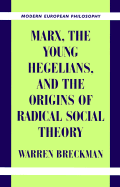Book contents
- Frontmatter
- Contents
- Acknowledgments
- Introduction
- 1 At the End of Idealism: From “Nihilism” to “Positive Philosophy”
- 2 The Transcendent Sovereign and the Political Theology of Restoration
- 3 Ludwig Feuerbach and Christian Civil Society
- 4 The Social and Political Discourse of Personality, 1835–1840
- 5 Pantheism, Social Question, and the Third Age
- 6 Arnold Ruge: Radical Democracy and the Politics of Personhood, 1838–1843
- 7 Karl Marx: From Social Republicanism to Communism
- Conclusion
- Bibliography
- Index
1 - At the End of Idealism: From “Nihilism” to “Positive Philosophy”
Published online by Cambridge University Press: 11 January 2010
- Frontmatter
- Contents
- Acknowledgments
- Introduction
- 1 At the End of Idealism: From “Nihilism” to “Positive Philosophy”
- 2 The Transcendent Sovereign and the Political Theology of Restoration
- 3 Ludwig Feuerbach and Christian Civil Society
- 4 The Social and Political Discourse of Personality, 1835–1840
- 5 Pantheism, Social Question, and the Third Age
- 6 Arnold Ruge: Radical Democracy and the Politics of Personhood, 1838–1843
- 7 Karl Marx: From Social Republicanism to Communism
- Conclusion
- Bibliography
- Index
Summary
In a classic article, Gustav Mayer once suggested that the religious and philosophical battles of the 1820s and 1830s were the most intense that Germany had witnessed since the Reformation. Whatever truth there is in Mayer's claim is due in large measure to the enormously controversial effects of Hegel's philosophy. The 1820s are often presented as years of ascendancy for Hegelianism among German intellectuals, but much would be lost to our understanding of the intellectual history of the early nineteenth century if we neglected the fact that outside the circle of Hegel's supporters, Hegelianism faced opposition from a wide variety of camps. The fact that Hegelianism was beleaguered in the 1820s and 1830s is hardly surprising. After all, fame tends to draw opponents into the open, whether out of petty resentment or a genuine sense that public recognition of one's enemy has raised the stakes of debate. More important, however, the controversy over Hegelianism also reflected the general situation of German and particularly Prussian intellectual life.
This dispute may be regarded as the last and climactic episode in the intense debate about the course of German philosophy that had begun with Kant's revolutionary redefinition of the tasks of philosophy in the 1780s. Kant had a powerful impact on German intellectual life in the late eighteenth century, particularly through the dissemination of Kantian ideas in popular organs such as the Allgemeine Literatur-Zeitung and the Allgemeine deutsche Bibliothek, as well as through Kant's exchanges with his many critics, including the Popularphilosophen who opposed Kant even as they championed enlightenment values.
- Type
- Chapter
- Information
- Marx, the Young Hegelians, and the Origins of Radical Social TheoryDethroning the Self, pp. 20 - 62Publisher: Cambridge University PressPrint publication year: 1998

